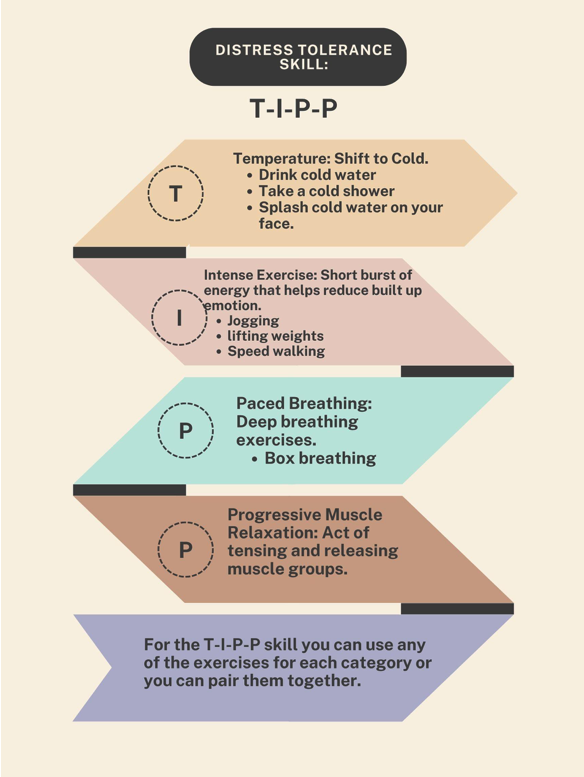Every day we are exposed to different stressors in our day-to-day activities. Sometimes these stressors can cause intense or overwhelming emotions that impact our ability to function in our day to day lives. Distress tolerance skills from dialectical behavior therapy (DBT) focus on ways to help individuals cope in the moment of high emotional dysregulation or distress.
Distress tolerance tools are ways to cope when stressors happen unexpectedly. We are not always able to plan or foresee when a crisis or distressing event may occur, so distress tolerance skills are ways to help you cope when these events happen.
Crisis or distressing events can cause you to become emotionally flooded or emotionally overwhelmed. When the brain is in fight or flight mode, our ability to respond in a logical and reasonable way is affected. Distress tolerance skills help you to self soothe so that you can stabilize your emotions to a point where you can access wise mind.

Wise mind is the balance between emotion mind and reason mind. When we are responding in wise mind you can respond in a rational and reasonable way without letting emotion or reactivity take over.
There are many different distress tolerance skills. I find that the T-I-P-P skill is one that can be used in most environments and situations. The T-I-P-P skill is great to use on the go, at work, at school, or even at home. What makes the skill so versatile is the ability to use these activities in any environment and it is applicable to all ages. If you are able to practice breathing strategies, can sit or lay down, or have access to cold water the T-I-P-P skill can be used. Intense exercise is the only component of the skill which may not be applicable in all situations.
The T-I-P-P skill can also be discrete with something as simple as a bottle of water on hand to sip slowly, or deep breaths and stretching and releasing muscles without drawing significant attention to oneself. This can help a person feel more comfortable and secure in varying environments when managing high stress or anxiety.
When to use the T-I-P-P skill:
The T-I-P-P skill is effective when you are experiencing an intense emotion in the moment that is hard to cope with.
- Temperature shifts allow your body to enter into the dive response which helps to slow your heart rate and breathing down allowing you to access wise mind. Wise mind is the balance between our emotion brain and reason brain. When you are in a state of wise mind you are able to process the situation and respond effectively.
- Intense exercise allows you to exert built up energy and emotion when experiencing high emotional distress. When we are able to release the built up energy you are able to feel more calm and centered.
- Paced breathing allows you to turn off your fight or flight response and reset your nervous system. Deep breathing acts as our body’s manual override when we are experiencing a high level of distress. Practicing breathing exercises for 3 to 5 min a day can help.
- Progressive Muscle relaxation allows your body to release tension that builds from high anxiety and stress responses. When using progressive muscle relaxation pairing it with paced breathing can help lower your distress level significantly. Typical length for the exercise is 5-10 minutes.

